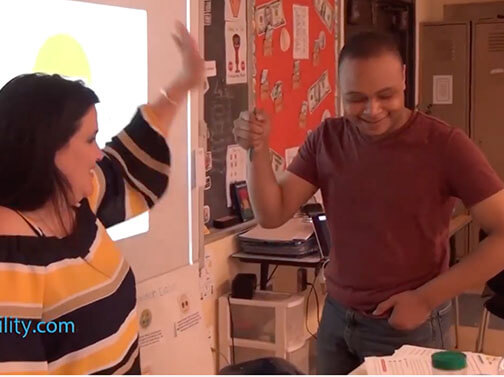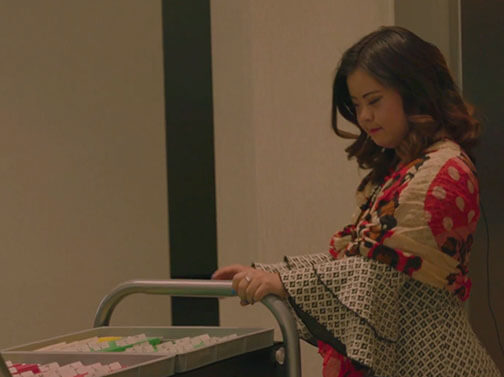As Pandemic Persists, Parents Of Students In
Special Ed Face ‘No-Win Situation’
As Pandemic Persists, Parents Of Students In Special Ed Face ‘No-Win Situation’
Original Article by Lillian Reed and Angela Roberts | November 4, 2020 | The Baltimore Sun/TNS
BALTIMORE — The desk from which Landon Stewart attends third grade looks less like a dining table these days and more like a high-tech command center, decked with two computer screens and colored pencils.
To attend school online this fall amid the COVID-19 pandemic, the 9-year-old, who is nonverbal, requires a myriad of devices, including one that allows him to select words on a screen with eye movements so he can communicate with his teacher.
Landon’s mother, Allison Stewart, savors watching her son’s schooling at home in Dundalk, like the moment he lit up after getting a perfect score on a test he was able to turn in without help. But she also worries because Landon is missing out on special educational services, such as physical and speech therapy, which are difficult to deliver remotely.
He is starting to show signs of regressing on skills that he had previously mastered — when asked recently to break down the elements of a story about a dog, for instance, he struggled to do so sequentially. Another day, Landon had a meltdown when some features of his devices didn’t work properly.
“He said, ‘Please don’t make me do this anymore,'” his mom recalled.
Landon is among the roughly 1 in 8 Maryland students who has a disability and is guaranteed access to specialized education services by law. But many of those services were altered or cut off when school districts closed buildings in response to the pandemic.
Some Baltimore-area school systems have made students in special education a priority to return to classrooms this fall. The plans are an acknowledgment that online instruction, which requires students to spend hours in front of a computer screen, poses a serious challenge for some children with disabilities.
But often those same students have underlying health conditions that put them at a higher risk for COVID-19, and some teachers and parents worry that returning to schools is too dangerous.
The situation has left students, parents, school systems and educators with no simple answers.
Stewart wants her son back in school for face-to-face lessons.
“I’m definitely not a teacher, nor do I have the ability to modify curriculum in real time,” she said. “I don’t know how to say ‘this isn’t working’ and fix it. I don’t want to cause bad habits.”
Baltimore County plans to reopen four special education schools in November, but Landon likely won’t be eligible to return, Stewart said.
Under federal law that guarantees students the right to learn in the “least restrictive environment,” her son typically receives instruction in a mainstream classroom. That means Landon, who is cognitively on par with his third grade peers, will have to wait until most other students are allowed to return to brick-and-mortar schools.
Howard County school officials are surveying parents of students who receive special education services to gauge how many would be interested in having their children return to a school building. The district says it’s focusing on the highest-need students first, and any return will depend on staffing and health and safety guidelines.
Carroll County allowed 169 students receiving the most intensive special services to return to classrooms this semester, with plans to bring in 70 more soon, said Nick Shockney, Carroll’s director of special education.
The Anne Arundel and Harford county school systems did not respond to a request for interviews.
Several special education advocates told The Baltimore Sun that families have reported seeing regression in their children since schools closed in the spring.
Leslie Margolis, an attorney with Disability Rights Maryland, represents both families who are desperate for schools to reopen and those who are fearful of the health risks to their children. School systems and state education leaders should consider reopening plans that reflect that dichotomy, she said.
“Anytime you make a blanket decision without looking at individual needs, you run the risk of digging yourself into a hole,” Margolis said. “What we worry about is that school systems have not thought through a robust solution for students.”
Margolis criticized the Maryland State Department of Education for issuing “guardrails” for the 2020-21 school year while leaving school systems to sort through reopening plans on their own.
Families are turning to Disability Rights Maryland to learn how to obtain in-home services or advice on what to do if their child’s individualized education program isn’t being implemented. The queries indicate there’s a gap between state policies and school system practice, she said.
“There is a chasm between what the administration at the state and local levels think should be happening and what families are actually experiencing,” Margolis said. “The desperation, the anxiety, the feeling of being overwhelmed is a lot for families.”
Disability Rights Maryland has seen a spike in the number of families reaching out with questions during the pandemic, Margolis said.
At the Parents’ Place of Maryland, an Anne Arundel County nonprofit that provides families with resources to advocate for children in special education, “calls have escalated, and then some,” said executive director Rene Averitt-Sanzone.
Many parents report they are frustrated with online education, but some are scared by the health risks associated with in-person instruction, Averitt-Sanzone said.
“At the end of the day, it’s a no-win situation,” she said.
As Baltimore’s director of special education, Debra Brooks says it’s unrealistic to think all students will be able to get their necessary supports and services online.
Brooks is a proud grandmother to five Baltimore City students, ranging in grades from prekindergarten to a sophomore in high school.
“I have witnessed it all,” she said of the struggles facing students this year. The solution, she said, is to provide families with multiple options.
“There are going to be some students who are able to adapt and others for whom it’s going to be so challenging that we have to offer in-person,” she said.
The city school system recently brought about 45 students in special education programs back to school buildings in small groups. And school leaders plan to reopen 25 schools in November to serve students in pre-K, kindergarten and special education, and those experiencing homelessness. The district also will bring back students who are showing up less than 20% of the time for online lessons.
As Baltimore County school administrators prepare to reopen Ridge Ruxton School, a specialized school for youths with significant disabilities, teacher Kelly Yalfani says she fears the worst-case scenario — losing a student to COVID-19. That’s why she opposes the plan to reopen this fall.
“If you have to choose between student lives and best instruction practices, to us there’s no argument,” Yalfani said of Ridge Ruxton teachers like herself who oppose reopening this fall. “I’d rather wait.”
Educators at Ridge Ruxton are much more hands-on than in a mainstream setting, which poses a challenge for social distancing.
Yalfani helps her students with feeding tubes or by changing their diapers. Some students have behavioral issues that require an adult to be within 5 feet at all times. Others are nonverbal, meaning they can’t communicate to a teacher when they’re feeling symptoms, she said.
“I’m not worried about me, but I am worried about my students,” Yalfani said. “The thought of losing a student (to COVID-19) is unbearable.”
Some families say their students are thriving while learning at home.
Alejandro Estrada, a high school senior at Howard County’s River Hill High School, can focus more on what his teachers are saying and writing when he’s seated in front of his computer with headphones on.
The 17-year-old, who has autism, enjoys the surprises that sometimes play out in the background of his classmates’ screens — a pet makes a guest appearance, a teacher introduces his own youngsters or a classmate goes on a stroll outside while listening to the lesson.
Although Estrada misses hanging out with his friends at school, he’s willing to wait until the pandemic poses less of a threat before returning to the classroom.
“There are different reasons that make me want to go back to school, and different reasons that make me want to stay (at home),” he said. “But I don’t think we should go back to the building because I don’t think it would be safe.”
Alejandro’s mother, Marianela Estrada, knows other families with children who receive special education services haven’t fared as well.
She works with the Howard County Autism Society as a liaison for Spanish-speaking families. Making sure their children are receiving the special education services they need is even more difficult for parents who don’t speak English.
Estrada tells those families to trust that they can decide what’s best.
“You know your (child). You know what’s good for them. If something doesn’t work, you have to speak up.”
As a former teacher, Catherine Carter believed she was prepared to help her five children — four of whom receive special educational services — navigate online learning.
But after weeks of deciphering schedules and soothing daily breakdowns triggered by missed assignments, Carter threw up her hands and withdrew four of her kids from Howard County public schools to home-school them. She cried together with her youngest’s kindergarten teacher as she delivered the news, assuring the educator that it wasn’t her fault.
The family plans to continue home-schooling for a year before deciding whether public health conditions are safe enough to return to the classroom. For now, though, the switch has lifted a weight from everyone’s shoulders, Carter said.
She doesn’t have to navigate a labyrinth of curricula anymore. Instead, she’s bought textbooks for her four children, and she tells them:
“You’re going to start on page one, and what’s after page one? Page two.”
© 2020 The Baltimore Sun
Distributed by Tribune Content Agency, LLC
Ready to bring Digitability to your school?
Complete the form on this page to request a demo.
You may also be interested in...
Get Your FREE Quote Today!
Suggested Videos
Positive Reinforcement and Healthy Classroom Culture: Guided Activity
Teachers can prompt their students to dance when the correct answer is selected, positively reinforcing their success as a class or team.
Preparing Students with Disabilities for the Workforce
Meet Digitability's very own Dana Steinwart and her former student Grace Walline. They speak about how her program helped Grace get hired and how work life has been.
Google Improving Accessibility
Google says it is working yo make smartphones easier to use for people with cognitive disabilities



